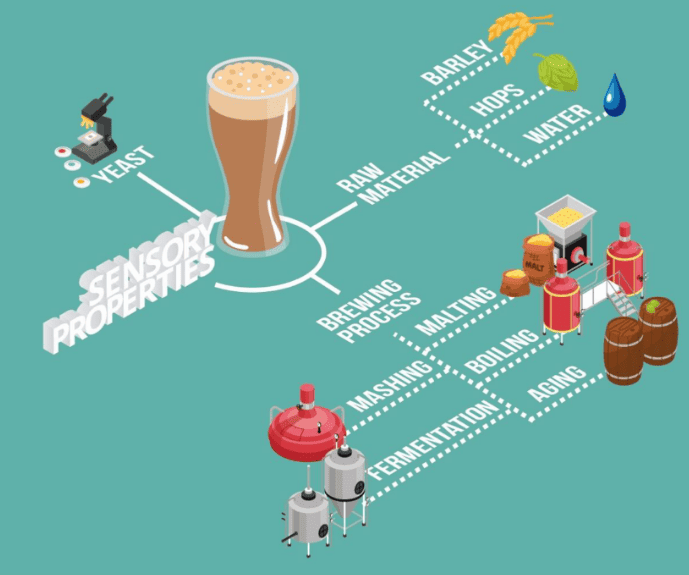Unlock the mystery of alcohol intoxication levels with beer. Dive into the factors that impact your buzz from light to lager.

Image courtesy of Airam Dato-on via Pexels
Table of Contents
Settle in with a cold one as we dive into the age-old question: How many beers does it take to get drunk? The answer might not be as straightforward as you think. In this blog post, we will take a closer look at the science behind alcohol metabolism, individual tolerance levels, and various factors influencing intoxication. So, grab your favorite brew, sit back, and let’s explore the intriguing world of beer and intoxication.
The Science of Alcohol Metabolism
Alcohol metabolism is a complex process that occurs primarily in the liver. When you consume a beer, the alcohol is absorbed into the bloodstream and then processed by enzymes in the liver. One key concept to understand is blood alcohol concentration (BAC), which measures the amount of alcohol in your bloodstream. As your BAC increases, so does the level of intoxication.
Factors influencing how your body metabolizes alcohol include your body weight, metabolism rate, and genetic predisposition. For example, individuals with a higher body weight tend to have a lower BAC compared to those with a lower body weight. Additionally, some people have genetic variations that make them more or less efficient at metabolizing alcohol, which can impact how quickly they become intoxicated.
Individual Tolerance Levels
Everyone’s tolerance to alcohol is different. Factors such as how often you drink, your overall health, and even your age can influence how quickly you become intoxicated. Occasional drinkers may feel the effects of alcohol more quickly than frequent drinkers, as their bodies are not as accustomed to processing alcohol. Age also plays a role, as older individuals tend to have a lower tolerance to alcohol due to changes in metabolism and decreased liver function.
Understanding your own tolerance level is crucial when it comes to drinking responsibly. It’s important to know when to stop and listen to your body’s signals. Keep in mind that alcohol affects everyone differently, so it’s essential to know your limits and respect them.
Factors Influencing Intoxication
Several factors can influence how many beers it takes to get drunk. One key factor is food consumption. Eating a meal before drinking can help slow down the absorption of alcohol, reducing the chances of becoming intoxicated quickly. Hydration is also important, as drinking plenty of water can help dilute alcohol in your bloodstream.

Image courtesy of www.peoplepowerbeer.com via Google Images
The type of alcohol you consume can also impact intoxication levels. Mixing different types of alcohol, such as beer and liquor, can increase the chances of getting drunk faster. Additionally, certain factors like gender can play a role, as women tend to have a higher BAC compared to men of the same weight due to differences in body composition and enzyme activity.
Conclusion
As we’ve explored in this blog post, the question of how many beers it takes to get drunk is not a simple one. The science behind alcohol metabolism, individual tolerance levels, and various factors influencing intoxication is complex and multifaceted. It’s essential to drink responsibly, understand your own limits, and be aware of the factors that can influence how quickly you become intoxicated.
So, next time you’re enjoying a cold one, remember to savor the taste and drink in moderation. Your body will thank you, and you can have a safe and enjoyable experience with beer and intoxication.
FAQ Section
How does body weight affect alcohol intoxication levels?
Body weight plays a significant role in alcohol metabolism. Individuals with higher body weight tend to have a lower blood alcohol concentration (BAC) compared to those with lower body weight.
Can drinking water help reduce intoxication levels?
Yes, staying hydrated by drinking plenty of water can help dilute alcohol in your bloodstream and potentially reduce the chances of becoming intoxicated quickly.
Why do women tend to have a higher BAC compared to men?
Women typically have a higher BAC compared to men of the same weight due to differences in body composition, enzyme activity, and hormonal influences on alcohol metabolism.
How does food consumption impact alcohol intoxication?
Eating a meal before drinking can help slow down the absorption of alcohol, reducing the chances of getting intoxicated quickly. It’s recommended to have food in your stomach before consuming alcohol to help moderate its effects.
Powered by Texta.ai Blog Automation
Leave a Reply